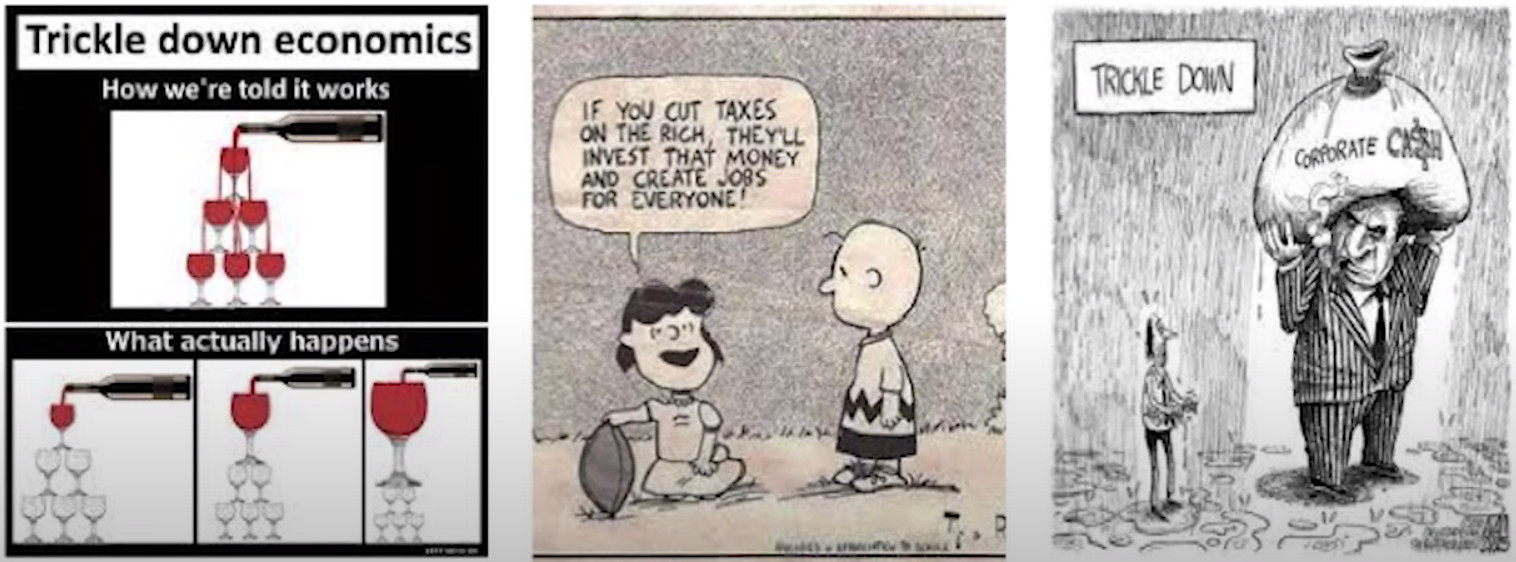
Date: 2024-12-21 Page is: DBtxt003.php txt00021859
US INEQUALITY
WHY IS IT AT RECORD LEVELS?
Robert Reich: Personal history: Why CEO pay exploded ... It happened one day in a White House meeting
WHY IS IT AT RECORD LEVELS?
Robert Reich: Personal history: Why CEO pay exploded ... It happened one day in a White House meeting

Burgess COMMENTARY
This anecdote from Robert Reich sounds very authentic and is certainly part of the story. My own version of history is that by the time Clinton was President a lot of the damage had already been done. The US economy was struggling by the late 1960s for a variety of reasons which I will address elsewhere ... but in 1973 the US economy went into free fall when OPEC raised the price of a barrel of crude oil from $3.50 a barrel to $13.00 a barrel. By 1980 the price of crude oil had already increased to more than $30.00. This completely changed the economics of almost every American based business and there was little that business in America could do to reduce the energy component of their operating costs. The only way to stay profitable was to increase prices ... a 'cost push' inflation of historic proportions that set the stage for President Reagan and his economic thinking.
It was during the Reagan period that American business embraced improvement of worker productivity by reducing regulation of all sorts which translated to massive outsourcing of production jobs to low wage low regulation countries like China and other Asian countries. While the USA was starved of investment funds for new and more efficient production facilities China and other Asian countries got a flood of US money for new state-of-the-art investment.
My impression is that Clinton did not comprehend much of the longer term damage to the US economy and society that the apparent economic success of his period in office seemed to show. I have been upset over the decisions made by Secretary Rubin in connection with reduced oversight of the banking sector ... so this little anecdote is perfectly in line with my outsider observation!!!!!!
Peter Burgess
It happened one day in a White House meeting
Written by Robert Reich
November 2nd, 2021 ... accessed March 2022
“Grandpa, why did top executives began to get so rich in the Clinton administration when you were in the cabinet?”
“For many reasons, sweetie. One of the most important was that most of their pay started to be linked to the price of their company’s shares of stock.”
“But grandpa, didn’t this encourage executives to do all sorts of bad things to increase their stock prices, such as cutting worker’s pay and benefits, and moving jobs overseas?”
“Yes, my sweet, it did.”
“And besides, I thought President Clinton didn’t want top executives to earn so much more than their workers. He said that when he first campaigned for President.”
“You’re right again, pumpkin. But one day early in his administration, several of his economic advisers had a meeting ….”
Robert Rubin (head of the National Economic Council, former chairman of Goldman Sachs): During the campaign the President said he didn’t want companies to be able to deduct executive pay exceeding $1 million from their taxable earnings. We need to pin this down for the budget and get him a recommendation.
Lloyd Bentsen (Secretary of the Treasury, former Senator from Texas): He proposed a lot of things during the campaign. Circumstances change.
Me: It got a lot of press. A lot of people out there think corporate executives are overpaid. He can’t reverse himself without being accused of waffling.
Bentsen: Well, they’re wrong. It takes a lot more than a million dollars to attract a talented CEO these days, and he’s worth every penny if he can make the company more competitive and raise the value of its shares.
Leon Panetta (Chief of Staff, former member of Congress from California): Maybe there’s some way we can do this without actually limiting executive pay.
Me: Look, we’re not limiting executive pay. Companies could still pay their executives whatever they wanted to pay them. We’re just saying that society shouldn’t subsidize through the tax laws any pay over a million bucks.
Laura Tyson (Chair of the Council of Economic Advisers, former Berkeley professor): What are we really trying to accomplish with the proposal? Discourage companies from paying their executives more than a million dollars, or making sure that when they do, they’re really acting in the best interest of their shareholders?
Bentsen: We have no business doing either, but the second is more valid.
Rubin: I agree with Lloyd. Why not require that pay over a million dollars be linked to company performance? Executives have to receive it in shares of stock or stock options, that sort of thing. If no linkage, no tax deduction.
Panetta: Good idea. It’s consistent with what the President promised, and it won’t create flak in the business community.
Me: But we’re not just talking about shareholders. The wage gap is widening in this country, and it affects everybody.
Bentsen: Look Bob. We shouldn’t be social engineering through the tax code. And there’s no reason to declare class warfare. I think we’ve arrived at a good compromise. I propose that we recommend it to the President.
Rubin: Fine. Now to a few other items on the agenda ….